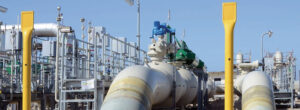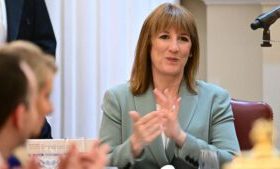LONDON — After Russia invaded Ukraine a year ago, European nations faced an onslaught of crippling new challenges – including working out how to swiftly replace the Russian gas that supplied 40% of their energy needs and kept families warm in the winter.
A year later, use of dirtier fossil fuels such as coal has expanded to help fill the gap, governments have spent billions subsidizing heating bills as gas companies reap record profits, and countries are competing to build terminals to import gas from new suppliers, from the United States to Qatar and Nigeria.
But Europe also quietly produced more electricity from renewable sources than from gas last year, for the first time, according to European Commission President Ursula von der Leyen.
The European Union (EU) Green New Deal – aimed at making the bloc carbon-neutral by 2050 – has held together through the Ukraine shock, while fresh plans to slash dependency on Russian fossil fuels by 2027, using renewables and energy efficiency, are advancing.
“The good news from this crisis, if there is any, is that it has brought European leaders closer together. Europe’s energy policy is more coherent than ever and more ambitious,” said Ani Dasgupta, president of the US-based World Resources Institute.
The Ukraine conflict, meanwhile, has sent shockwaves through global energy markets, with higher prices raising questions in regions planning to use more gas, including Asia, about whether that is the right answer for the future, energy experts say.
Fatih Birol, executive director of the International Energy Agency, believes the Ukraine war may mark a fundamental shift in how countries in Europe and beyond judge their energy security – and could spur a new acceleration on renewables in response.
“Energy markets and policies have changed as a result of Russia’s invasion of Ukraine, not just for the time being but for decades to come,” Birol argued in his agency’s annual energy outlook, published in October.
“Government responses around the world promise to make this a historic and definitive turning point towards a cleaner, more affordable and more secure energy system.”
POLITICAL PRIORITY
One key change as a result of the Russian invasion is that energy concerns have moved dramatically up the European political agenda, said Jonathan Stern, a long-time energy researcher at the Oxford Institute for Energy Studies.
“Energy has become an immediate voter issue – unlike climate change,” he said in an interview. “Voters are having to pay more money, voters are concerned if they’ll get their energy – and politicians know elections are never more than a couple of years away.”
Soaring gas prices helped push the average inflation rate across the EU to a record high of 11.5% in October 2022, as expensive food and fossil fuel-based fertilizers stoked the cost of living and hiked concerns over food security.
But European gas prices have dropped as much as 85% since peaking last summer, easing some of the pressure.
Still, Raphael Hanoteaux, a policy advisor on gas politics for climate and energy at think-tank E3G, said the energy crisis had placed issues such as how to ramp up renewables and increase energy efficiency, while reducing fossil-fuel use, “front and center of not only the climate debate but the security debate”.
Continuing price volatility in gas markets – as the conflict in Ukraine drags on and Russia reorients its exports towards Asia – is a huge worry for European governments that have spent nearly 800 billion euros ($853 billion) subsidizing home and business energy bills, and are wondering how long they can keep it up, he added.
Without Russian gas, “it’s way more profitable to build wind and solar capacity than to scramble to Qatar or Azerbaijan to secure fossil fuels”, Hanoteaux said in an interview.
Faced with tough choices, the Netherlands, Germany and France all are looking at shifts such as phasing down gas-powered heating in buildings and boosting installation of renewables – though solar and wind are still far more widely used for electricity production than heating.
EU commissioners also have debated mandatory cuts in gas and electricity use. “We’re now discussing things that were impossible months ago,” Hanoteaux noted.
Not all countries are on board, though. Hungary, for one, has said it expects Russian gas to remain important to its energy supply, noting it would be happy to sign new long-term deals with Moscow.
BARE COFFERS
One big question is how to pay for a much-needed surge in renewables at a time when government coffers and borrowing capacity are depleted after the COVID-19 pandemic and extensive spending on subsidies to keep homes warm this winter.
Many governments have long insisted they lack fiscal space to swiftly ramp up green energy to deal with climate change – nonetheless, in Europe, they have found huge amounts nearly overnight to subsidize energy bills and tackle the pandemic, Oxford’s Stern noted.
Now, however, after battling years of multiple crises, many are in a worse position to afford the renewables that – if invested in years ago – would have helped avert the current crisis, he said.
Once installed, renewable power is far cheaper in the long run. But the investment needed between 2021 and 2050 for a full transition to renewable power in Europe is estimated at $3.8 billion.
“This is the conundrum,” Stern said. “Although everyone keeps saying renewables are the cheapest form of energy now, which is correct, you still need to spend money now to get them – money you would have had if this (gas) crisis hadn’t happened.”
DASH FOR GAS
Despite a cash shortage, many European countries have been rushing to build gas import terminals to boost supplies – and a lack of coordination means huge over-capacity is now in the pipeline, said Greig Aitken of Global Energy Monitor.
“A lot has been done in panic,” he said, adding that “the general consensus is what is being planned is extremely excessive and inappropriate”.
At the same time, some European governments are considering shortening often lengthy siting processes to put new clean energy capacity in place, which could draw in more private investment, he noted.
And some states are talking about boosting nuclear power capacity, a move Oxford’s Stern finds “bizarre” given the projects require “massive” government subsidies and every one in Europe is “miles over budget and way over its supposed timeline”.
Meanwhile, efforts to add renewable energy capacity fast are being held back by market shortages of key minerals needed for things like battery storage systems, analysts warned.
Overall, virtually all European countries are behind schedule on their pledges to cut emissions to net zero – but the events of the past year have convinced most that “they need to try harder”, Stern said.
“The whole thing has become more difficult – but more urgent,” he said. “I believe the net effect is going to be positive.” — Reuters








